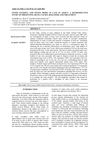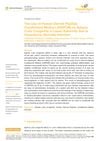 9 citations,
July 2018 in “Current Pharmaceutical Design”
9 citations,
July 2018 in “Current Pharmaceutical Design” HO-1 helps skin health and healing but can worsen melanoma; it's a potential treatment target for skin diseases.
 9 citations,
January 2018 in “Medical research archives”
9 citations,
January 2018 in “Medical research archives” Low-intensity light therapy is effective for skin healing, reducing inflammation, and treating various skin conditions.
 8 citations,
May 2021 in “Journal of the European Academy of Dermatology and Venereology”
8 citations,
May 2021 in “Journal of the European Academy of Dermatology and Venereology” A COVID-19 patient had unusual nail discoloration and nail separation possibly due to the virus's effects on small blood vessels.
 8 citations,
April 2020 in “Journal of Ethnopharmacology”
8 citations,
April 2020 in “Journal of Ethnopharmacology” Herbs might help with hair loss, but more research is needed to confirm their safety and effectiveness.
 7 citations,
June 2021 in “Trends in Food Science and Technology”
7 citations,
June 2021 in “Trends in Food Science and Technology” Western diet may cause male pattern baldness; low glycemic diet with magnesium could help.
 7 citations,
January 2018 in “International Journal of Dermatology”
7 citations,
January 2018 in “International Journal of Dermatology” AGA risk factors include age, smoking, hypertension for men, and age, dyslipidemia for women; lifestyle changes may help prevention.
 6 citations,
July 2021 in “Microbial biotechnology”
6 citations,
July 2021 in “Microbial biotechnology” The combined treatment with engineered bacteria and yellow LED light improved wound healing in mice.
 6 citations,
April 2013 in “Assiut Veterinary Medical Journal/Maǧallaẗ Asyūṭ al-ṭibiyyaẗ al-baytariyyaẗ”
6 citations,
April 2013 in “Assiut Veterinary Medical Journal/Maǧallaẗ Asyūṭ al-ṭibiyyaẗ al-baytariyyaẗ” Most cats with ear infections recovered after treatment, especially Turkish Angora and Persian breeds.
 6 citations,
May 1993 in “Archives of Disease in Childhood”
6 citations,
May 1993 in “Archives of Disease in Childhood” Children's hair loss can be caused by many factors, including autoimmune diseases, emotional stress, genetics, and infections, with treatment and prognosis varying.
 5 citations,
March 2020 in “Current Opinion in Endocrine and Metabolic Research”
5 citations,
March 2020 in “Current Opinion in Endocrine and Metabolic Research” Skin problems in PCOS, like excess hair, acne, and hair loss, may not always indicate high male hormone levels and need careful diagnosis for proper treatment.
 5 citations,
March 2018 in “Advances in integrative medicine”
5 citations,
March 2018 in “Advances in integrative medicine” A 23-year-old woman with Hashimoto’s thyroiditis improved significantly after a 15-month integrative treatment plan.
 3 citations,
May 2023 in “Biomedicines”
3 citations,
May 2023 in “Biomedicines” PCOS causes infertility mainly due to hormonal imbalances, insulin resistance, and chronic inflammation.
 3 citations,
May 2018 in “Journal of Cosmetic Dermatology”
3 citations,
May 2018 in “Journal of Cosmetic Dermatology” Biopsy can differentiate between alopecia areata and androgenic alopecia, and if more information is needed, testing for CD3 and CD8 can help.
 2 citations,
April 2021 in “bioRxiv (Cold Spring Harbor Laboratory)”
2 citations,
April 2021 in “bioRxiv (Cold Spring Harbor Laboratory)” The conclusion is that analyzing RNA from skin oils is a promising way to understand skin diseases.
 2 citations,
October 2018 in “Springer eBooks”
2 citations,
October 2018 in “Springer eBooks” Cancer treatments can cause skin-related side effects that may affect patient quality of life and require changes in treatment.

research Acne
2 citations,
May 2011 in “Harper's Textbook of Pediatric Dermatology” Acne is a common skin condition linked to diet, hormones, and genetics, and early treatment can prevent scarring.
 1 citations,
March 2024 in “Signal transduction and targeted therapy”
1 citations,
March 2024 in “Signal transduction and targeted therapy” NF-κB signaling is crucial in many diseases and can be targeted for new treatments.
 1 citations,
January 2023 in “Frontiers in veterinary science”
1 citations,
January 2023 in “Frontiers in veterinary science” Activating autophagy in dogs with certain diseases improves their skin and hair.
 1 citations,
January 2023 in “Metabolites”
1 citations,
January 2023 in “Metabolites” Changes in gut bacteria can contribute to the development of Polycystic Ovary Syndrome (PCOS), affecting metabolism, immunity, and causing inflammation. Treatments may involve adjusting these factors.
 1 citations,
March 2019 in “KnE life sciences”
1 citations,
March 2019 in “KnE life sciences” HDPCM treatment healed a baby's congenital skin defect caused by varicella infection.
1 citations,
January 2018 in “Cogent Medicine” Careful management of steroid use is crucial in pregnant women with bullous pemphigoid to avoid complications like Cushing syndrome.
 July 2024 in “Journal of Investigative Dermatology”
July 2024 in “Journal of Investigative Dermatology” Losing both ERBB2 and ERBB3 receptors in mice causes significant skin problems and inflammation.
 January 2024 in “Archives of dermatological research”
January 2024 in “Archives of dermatological research” Both treatments for alopecia areata showed similar modest effectiveness.
 June 2023 in “Journal of multidisciplinary sciences”
June 2023 in “Journal of multidisciplinary sciences” PCOS may increase the risk of certain cancers.
 December 2022 in “International Journal of Biomedicine”
December 2022 in “International Journal of Biomedicine” Androgens may worsen COVID-19 and hair loss could indicate the disease's severity.
 August 2022 in “Research Square (Research Square)”
August 2022 in “Research Square (Research Square)” Implanted special stem cells from hair follicles helped heal wounds faster and with less scarring in mice.

Low-level laser therapy is a safe, painless method that effectively treats acne and improves skin without post-treatment care.
 May 2022 in “Acta Scientific Women's Health”
May 2022 in “Acta Scientific Women's Health” A woman lost over 80% of her hair due to a condition called telogen effluvium after having COVID-19.
 July 2021 in “Journal of dermatology research and therapy”
July 2021 in “Journal of dermatology research and therapy” Using combined treatments can help manage acne by targeting the bacteria and skin changes that cause it.
 July 2021 in “Journal of emerging technologies and innovative research”
July 2021 in “Journal of emerging technologies and innovative research” Ayurvedic methods successfully treated severe acne in a patient.





























